What to EXPECT from your RV Water Filter and why you NEED one…
Simple Fact: We ALL need water, and we ALL wish to avoid water with anything in it that can make us sick. Agreed? With these two clear and universally accepted statements, lets proceed to talk about the water in our RV campers.
Should you trust the water that comes out of your RV Camper’s faucet?
My answer is “it depends.” Before we get into details, understand that your RV’s faucet is NOT the only potential source of pure, clean drinking water in your RV camper. I will explain as we proceed.
Water Filtering Systems designed for your RV camper
For those of us who want clean, pure drinking water in our RV’s, there are 3 approaches that can *potentially* give you clean, pure drinking water in your RV.
- Whole “house” or entire RV water filtering system
- Under the sink RV water filtering system
- Countertop water filtering system
Of the three types of RV water filtering systems available, I’ll let the cat out of the bag right now – I prefer #3 – as you read on, you’ll see why, but first allow me to give you some additional background on water filtering technology (as I understand it.)
Water Filtering and the Importance of “microns” – What water filtering does and what it will NOT do…
This paragraph represents MY point of view, and honestly it differs from some of the claims made about the systems detailed in this article. With that said, here we go: Understand that none of the 3 types of water filtering systems I named above enable you to take “pond water” (any truly dirty water that will make you sick if you drink from it untreated) and turn it into pure, safe, drinking water.
Pond water or any untreated water (before it reaches you) may contain cryptosporidium, giardia and many other microorganisms, chemicals or heavy metals that can ruin your day (or your life!) There ARE filters designed to filter untreated surface water and I briefly address them in the next section.
Water filters that work with virtually ANY water source…
The ONLY filters I personally trust to turn pond water (really any surface water) into potable water are filters like the Sawyer and Survivor water filters. These filters are small, portable water filters that remove anything from water that is larger than 0.1 microns (in the case of the Sawyer) or 0.01 microns (in the case of the Survivor.)
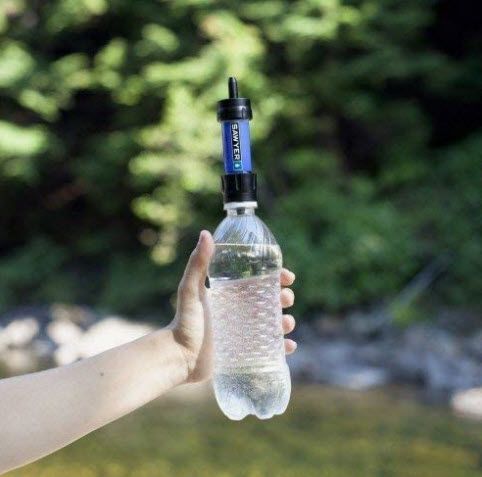

A micron is a measurement of length. One micron is equal to one-millionth of a meter. The smaller the micron measurement, the more contaminants (microorganisms, heavy metals, dangerous chemicals, etc.) that are removed from the water that passes through these filters – and the longer it takes to filter the water.
The Sawyer and Survivor filters are best designed for hikers or those in back-country who will need to ingest surface (untreated) water (NOT salt water.) I carry a few of these filters with me in my RV for a potential “SHTF” scenario for where (or WHEN) relatively safe pre-treated water is NOT available. Unless you have no access to well or municipally treated water, these filters are not intended for daily use.
What should you expect from a RV water filtering system?
The smallest micron measurement I found in my research for any of the RV water filter systems I’m about to share is 0.2 microns – too large a figure to trust anything OTHER than pre-treated water or well water to pass through them – which can STILL have plenty of issues!
In other words (in my humble opinion), NONE of the RV water filter systems available today will turn “pond water” into safe drinking water. Flow rate is the reason water filtering systems for your RV will likely never filter anything smaller than 0.2 microns. In other words, the smaller the particle you wish to filter, the longer it takes for the water to pass through the filter.
For emphasis: Realize that just because water is treated by a municipality or acquired from a well that has been tested, does not mean its great water (or perhaps even safe) for human consumption!
As RV travelers, we encounter water from many sources that may have many issues that CAN and WILL cause trouble in our bodies.
Entire RV camper water filtering systems
Entire RV camper water filtering systems are designed to filter water as (or before) it enters your RV. As a rule, with one notable exception they are fairly large and bulky and still leave you at risk if your RV’s plumbing (water lines) or fresh water tank are contaminated. As they filter ALL the water that enters your camper, they’re expensive to operate. I say this because (in my view at least), you don’t need all your RV’s water to be absolutely pure. I’m certainly not an advocate of dirty water anywhere in your RV, but I’m sure you’d agree that the water you drink must be held to a higher standard than water you shower with (to name just one additional use of water in your camper.)
Each of these systems filters AT MOST 5000 gallons before the filters need to be replaced. If you’re a part-timer and there’s more than a week or so between trips in your RV, you’ll need to remove the filters and dry them to prep them for proper storage.
Based upon “typical” water usage in your camper (total water use), 2 people living full time in a RV camper will need to replace the filters at least every 3 months, and with one product, probably every 6-8 weeks!
I’m going to share details about three systems designed for the RV that filter the whole house. These include the Camco, Clearsource, and RV Water Filter Store water filters.
Camco Water Filter
The Camco filters are very inexpensive, but their use is limited. Their cost is approx. $27. for 2 filters and they filter to 20 microns. Their life expectancy is about 3 months. At 20 microns, the most they’ll filter is “sediment” in the water. Sediment includes sand, dirt, and small pebbles.
My perspective on these filters is it can’t hurt to put them “inline” with your water hose, but as a full timer now for 10+ years, I find that collection of sediment, dirt, sand and pebbles to be a minor nuisance. If I find a faucet to be slowing its flow, I check the trap (usually by unscrewing the faucet) for sediments. In 5 years in my current camper, I’ve done this once.
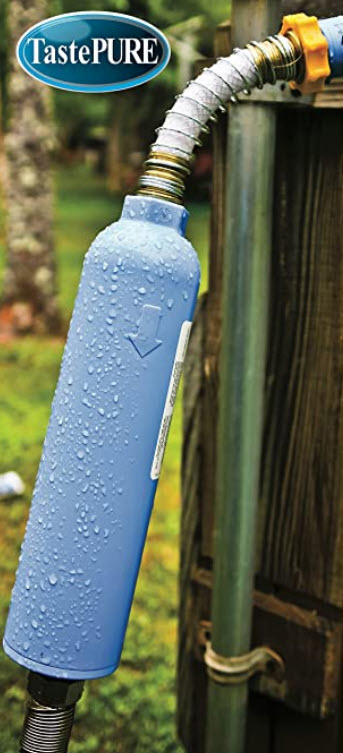
Summary: At most, this filter is a “first stage” in protecting your camper. As they are not very expensive, they do provide a service to you at a low cost, but they are not to be relied upon for having pure, clean water in your camper!
Two “high end” full house RV water filter systems.
Clearsource and the RV Water Filter Store offer full house systems that I’m sure do their job, but as I noted earlier they’re expensive to maintain and present another challenge I will detail in a moment.
The Clearsource system costs about $400., provides 0.2 micron protection (remember – water must still be treated or be well water before entering the filter), replacement filters cost $60.00. The life of filter: 2000 gallons or every 3 mos. One stat that stood out from their website is their filters block 95% of the lead (read on for something even better!)
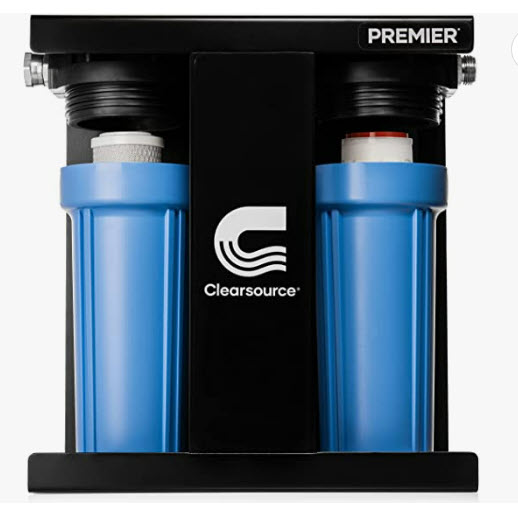
The RV Water Filter Store’s water filtering system costs about $200., plus accessories such as housing and/or required adapters. You’ll need to replace the filters (cost $40.) AT LEAST 2x per year which can handle a max of 5000 gallons. The filtering works to 0.5 micron. They claim 99.95% of giardia & cryptosporidium cysts are removed.
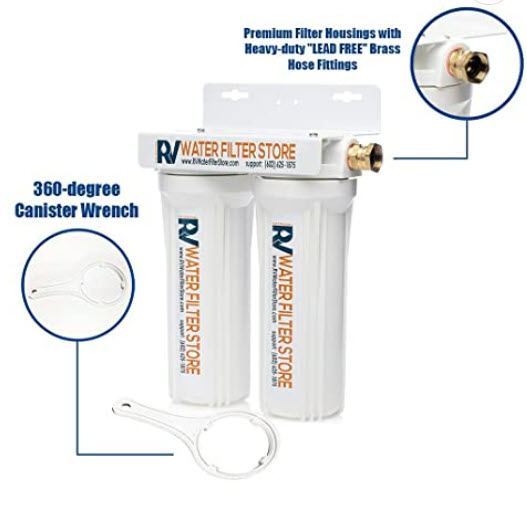
Your RV’s plumbing – maintain it or risk illness…
It is particularly important for the full house RV water filtering systems to have the RV’s plumbing maintained. Since the filtering is done before water enters your home, any contaminants in the fresh water tank OR the water lines will negate the work done by the Clearsource or RV Water Filter Store system.
This is not to underplay the importance of ALL rv’ers maintaining and periodically cleaning their rv’s plumbing system. How? Twice a year, I drain my fresh water tank, then refill it after adding a cup of bleach per 40 gallons. My tank holds 80 gallons, so I use two cups. I then run all faucets until I smell chlorine, then close them and leave things alone for 24 hours. Ideally, if you can travel with the camper, that will help.
After 24 hours, I run my water pump and open my faucets until the fresh water tank is empty. I then repeat the process for another 24 hours. After that, I drain the fresh water tank and refill it with fresh water only. I do this about every 6 months. This action kills any bacteria in my fresh water lines or in the fresh water gravity tank.
Under the sink water filter systems for RV’s
In this section, I’m going to highlight only one system – the Premier Watts System. It filters down to 1 micron, and costs about $100. The filters can handle up to 600 gallons and cost about $40. Watts recommends replacing them every 6 months.
While you’re now filtering less water than the whole house systems, these systems often require a “standard faucet” (ie – no pull to spray function), they also end up filtering water you don’t really need filtered water for such as washing dishes. So, in my view, the filtered water is wasted as much as its used for drinking – the real purpose for filtering water!
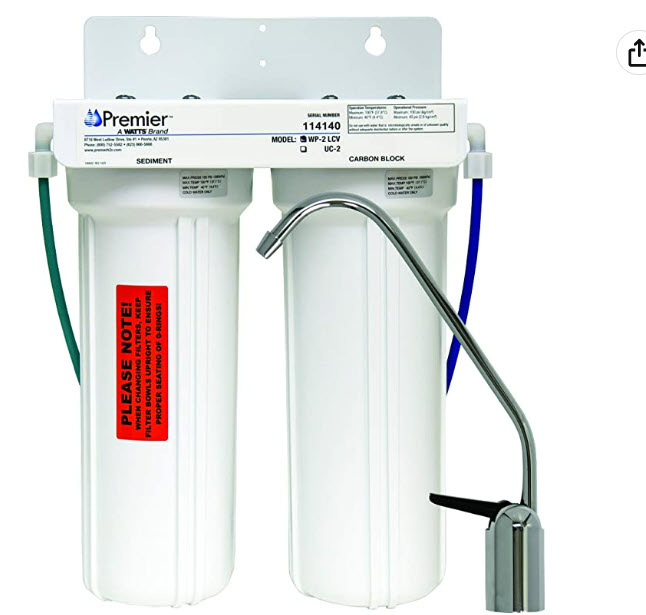
An added challenge: As these are under sink systems, you may find you have limited space AND IF there is any failure in the hose attachments, you WILL have a major flood on your hands inside your camper. Bottom line: not worth the risk in my view when (again in my view), there’s a BETTER ALTERNATIVE…
Countertop RV water filtering systems
Allow me to state at the outset two things: THIS is the approach I use AND the only downside is yielding some counter space to the water container. This approach filters only the water you plan to ingest, potentially cook with, or brush your teeth with. That said, there are three Countertop RV Water Filter systems worth looking at – but in my view, ONE stands out: The ProOne Traveler (formerly ProPur.)
Why ProOne? The “Traveler” is a comfortable size for most RV Camper’s countertops. My 5th wheel has a relatively small amount of counter space and I’m still good with the Traveler occupying some of that ‘real estate.’ Further, while the ProOne has a 1 micron filtering ability (verified in a conversation with their CEO), their filtering technology enables their Traveler to remove 99.9% of lead, and a host of other nasty stuff as detailed in their independent lab report. You’ll find their filter to be quite thorough in filtering not just lead, but fluoride, micro-plastics and more. Some competitors don’t filter fluoride at all or require an additional filter to remove the fluoride.
In the course of preparing this article, I held a brief phone interview with ProOne’s CEO. He explained to me that due to the design of their filter, there is a higher absorption rate of contaminants than what their competitors can demonstrate. So, when judging filters, it’s not all about micron size, The general makeup of the filter is discussed on their website but understandably, the specifics are proprietary. An important note: The ceramic filter is infused with silver to act as an inhibitor to bacterial growth.
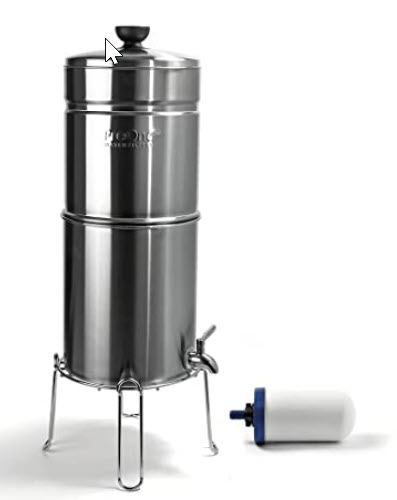
The cost of the Traveler is about $220. with one 5″ filter or about $280. with two 7″ filters. Each filter will work with up to 2000 gallons for up to 6 months (one year for the 7″.) Replacement filters are about $60 and up, depending upon size and the number of filters you purchase. (I keep several on-hand as who knows what will be available in 6 or 12 months from now!)
Incidentally… When I travel, my ProOne Traveler fits in my kitchen sink (remember it has two halves) and is easily re-assembled at my next destination.
One final note about ProOne, they do offer shower filters, under sink RV Water Filter systems, and more for those who are interested.
The Alexapure Pro is often compared to the ProOne Traveler. I prefer the ProOne as the spigot on the Alexapure is plastic in the Alexapure in comparison to the metal spigot in the ProOne Traveler. Further the Alexapure only filters 96.4% of lead out of water in comparison to ProOne’s 99.9% – this may not seem like a large difference, but lead is one of the contaminants you do NOT want ANY exposure to, and a statistician can explain that 96.4% is a huge difference from 99.9%.
Berkey also makes a countertop product, however their filters are NOT silver infused (recall this resists bacterial growth), and the Berkey is more expensive than the ProOne (by about $100.) So for these reasons, I recommend the ProOne Traveler as your #1 solution to filtering water.
Please note: all the links used in this article are Amazon affiliate links. Purchasing through them costs you nothing extra and fees received help me to cover my research and website related costs.
Like my content? Please share it, and comments are always welcome below! Also, please consider subscribing to my free newsletter to learn of new posts as I create them.